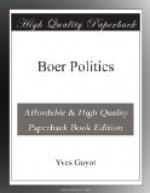In the Transvaal, law is an instrument made use of either to favor or oppress the individual, according to circumstances. If necessary it is made retrospective. To provide for the case of judges refusing to apply such laws, Law I. of 1897 has been passed, which compels them to swear obedience to the President and gives him the right to dismiss summarily such as prove insubordinate or lukewarm. The President of the High Court, Mr. Kotze, fell under the action of this law, in February, 1898.
Before that law, the President annulled any judgments that displeased him and caused the fines or damages inflicted upon the delinquents to be paid out of the public Treasury.
Such is judicial and legal rule in the Transvaal; and there are European lawyers of the opinion that the Uitlanders must be the most contemptible and lowest set of adventurers for not being satisfied with it! Dr. Kuyper declares that “the factitious discontent existed only among the English”; and adds with contempt, “Let us look into the Edgar, Lombaard, and Amphitheatre cases—mere police affairs.”
Well; let us consider Mr. Krueger’s interpretation of the duties of the police.
[Footnote 10: Le Siecle, March 30th, 1900.]
2.—The Police.
The chief of the departments of justice and police
is called the State
Attorney.
In 1895, when Mr. Esselen was promoted to the post, he stipulated that he should have full liberty of action. As chief detective officer he appointed an officer belonging to the Cape Administration, Mr. Andrew Trimble, who entered upon his duties with vigour and determination. The gold thieves and receivers and the illicit canteen keepers who supplied the natives with liquor were up in arms at once and appealed to President Krueger. They represented Trimble as having served in the English Army, and as being in receipt of a pension from the Cape Government, further stating that his appointment was an insult to the Boers, who had been thus judged unworthy to provide from among themselves a Head of Police. Mr. Esselen, who stood his ground, was dismissed and replaced by a Hollander, Dr. Coster. Mr. Trimble, chief of the detective force, was replaced by a man who had previously been dismissed, and has since been dismissed again.
As it was useless to depend upon the police for the arrest of thieves, the directors and officials of the City and Suburban Gold Mining Company took upon themselves the risks and dangers of police work. They caught two notorious characters, known thieves, with gold in their possession. The thieves openly boasted that nothing would be done to them; the next day, one was allowed to escape, the other, a notorious criminal, was condemned to six months’ imprisonment. Mr. Krueger regarded this penalty as excessive, remitted three-fourths of the sentence, and had him discharged unconditionally.
The police of Johannesburg, a town almost entirely inhabited by English, do not speak English—an excellent method of ensuring order! They are chosen from among the worst types of Boers, some of whom are the descendants of English deserters and Kaffir women; whence comes the fact that some bear English names. The policeman Jones, who killed Edgar, is a case in point.




